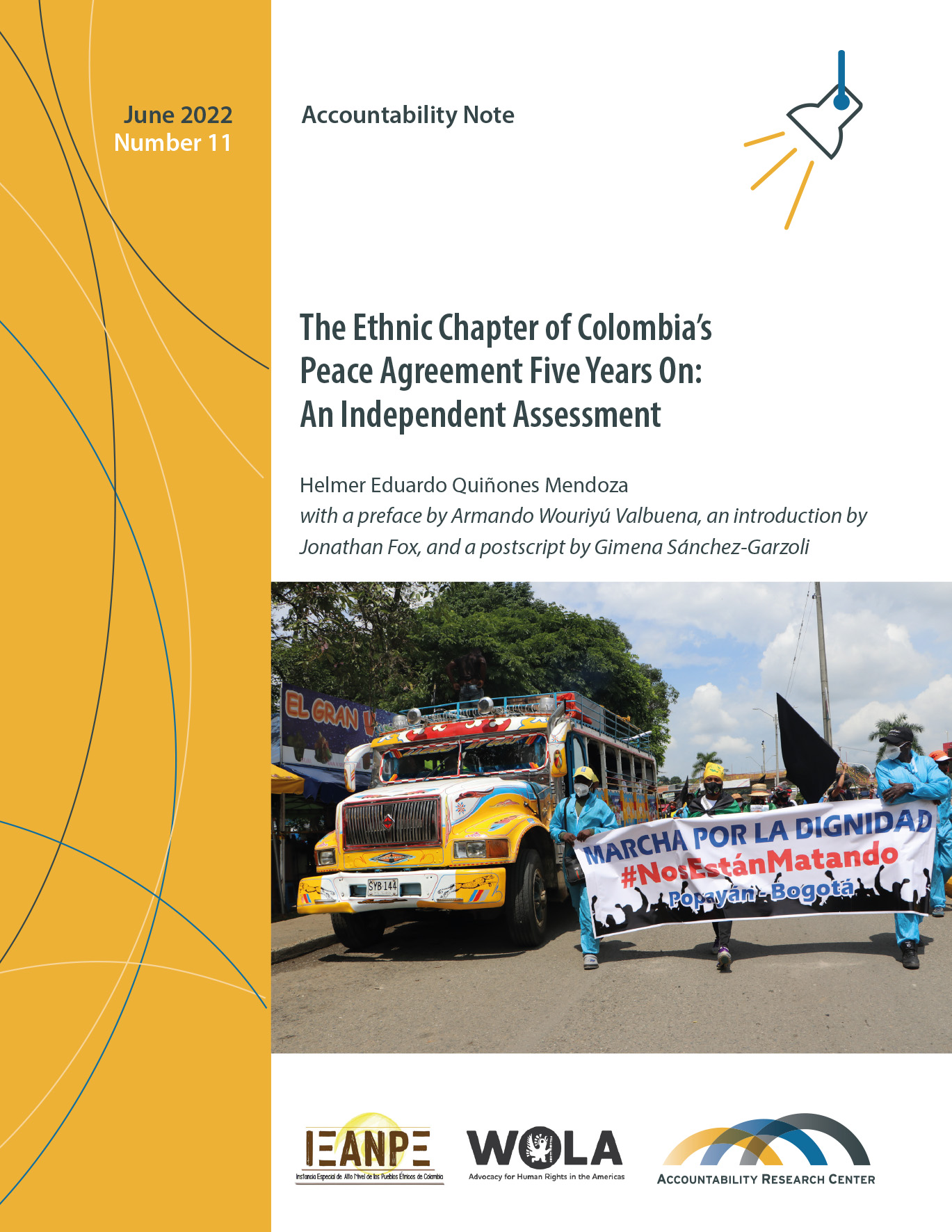
The Ethnic Chapter of Colombia’s Peace Agreement Five Years On: An Independent Assessment
Date: July 2022
Author(s): Helmer Eduardo Quiñones Mendoza
Publication type: Accountability Note
Published by: Accountability Research Center
In 2016, the Colombian Peace Agreement included an Ethnic Chapter designed to ensure the representation of and oversight by indigenous and Afro-Colombian social organizations in the implementation process. This recognition of ethnic rights as a cross-cutting agenda set a precedent among international peace-building processes. But failures in the implementation have meant that armed conflict and systematic violence against ethnic peoples and their territories have raged on. In this Accountability Note, Helmer Eduardo Quiñones Mendoza presents an assessment of the implementation of the Ethnic Chapter of the peace agreement. The assessment was carried out by the advisory team to the High-Level Forum with Ethnic Peoples (IEANPE), the main mechanism for monitoring and promoting the Ethnic Chapter, and presented to the Colombian government in 2021. Together with a preface by Armando Wouriyú Valbuena (Secretary of the Ethnic Commission, Technical Secretary of the IEANPE, and distinguished indigenous leader), an introduction by Jonathan Fox (ARC Director), and an afterword by Gimena Sánchez-Garzoli (Washington Office on Latin America), this note assesses implementation against each of the agreement’s six pillars, identifies entry points for improvement, and lays out an agenda for building a new future for Colombia’s ethnic minorities by fully implementing the Ethnic Chapter of the 2016 agreement. Read in Spanish here.
Helmer Eduardo Quiñones Mendoza is an Afro-descendant philosopher who studied in the Institute of Political Studies and International Relations of the National University of Colombia. Since 2005, his professional work has focused on democratization processes, institutional design, development planning, human rights, and international humanitarian law, including the field of transitional justice. He has worked with the United Nations, Ernst and Young, and with Colombian government agencies, including the National Planning Department and the Special Jurisdiction for Peace, among others. Since its institutionalization in December 2016, he has coordinated the advisory team of the High-Level Forum with Ethnic Peoples (IEANPE) of the CSIVI, the main mechanism for monitoring and promoting the Ethnic Chapter of the Peace Agreement. He has also worked closely with the National Afro-Colombian Peace Council (CONPA) and its member organizations, including the Interethnic Solidarity Forum for Chocó (FISCH). Since 2018, he has been part of the research team of the Accountability Research Center in the process of monitoring the implementation of the Plan Todos Somos Pazcífico (2016–2022), a Colombian government initiative to close the gap in access to basic services for the excluded Afro-descendant population in the Colombian Pacific region, with an investment of US$400 million backed by loans from the World Bank and the Inter-American Development Bank (IDB). His work supports communities on the ground, including social oversight initiatives in Tumaco, Quibdó, and Buenaventura. Armando Wouriyú Valbuena is a distinguished leader of the Wayuú people, a binational and ancestral indigenous community from the Guajira desert in northern Colombia. He has had to lead his community to address the difficult conditions they face in terms of food, which are especially acute for Wayuú children, as well as to confront the devastating environmental impact of coalmining in their territories. His leadership led him to serve as president of the National Indigenous Organization of Colombia (ONIC) from 1999 to 2003. The ONIC guides the indigenous movement in its dialogue with the Colombian State, the international community, and the country’s social and political actors. UNESCO declared him Master of Wisdom in 2009 in recognition of his contributions from indigenous culture. Indigenous Colombians and Afro-Colombians have a history of working together in their dialogue with the Colombian government. The process of including and implementing the Ethnic Chapter in the Peace Agreement, the first in the world, is an example of this partnership. Armando Wouriyú Valbuena has been chosen by the ethnic movement to lead this process as Secretary of the Ethnic Commission, the platform for peace, and as Secretary of the Ethnic Forum, a platform for dialogue and follow-up with the institutions of the Peace Agreement. Jonathan Fox is Professor of Development Studies in the School of International Service at American University in Washington DC, where he directs the Accountability Research Center. He works with diverse civil society organizations, as well as national and international policymakers, to analyze initiatives that promote participation, transparency, and accountability. Many of his publications are accessible at: www.jonathan-fox.org. Gimena Sánchez-Garzoli leads Colombia human rights advocacy work at the Washington Office on Latin America (WOLA). Ms. Sánchez is an expert on peace and illegal armed groups, internally displaced persons, human rights and ethnic minority rights. Her work has shed light on the situation of Colombia’s more than seven million internally displaced persons—as well as helped to expose the links between Colombia’s government and drug-funded paramilitaries. She is active in promoting labor rights and implementation of the US-Colombia Labor Action Plan
